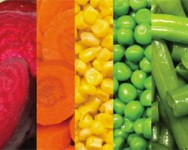NYS Processing Vegetable Industry Roundtable Meeting
Event Details
Date
March 18, 2024
Time
9:30 am - 2:45 pm; sign-in for credits at 9 am
Location
First United Methodist Church
8221 Lewiston Rd (Rt 63)
Batavia, NY 14020
Cost
FREE!
Host
Cornell Vegetable ProgramJulie Kikkert
585-313-8160
email Julie Kikkert

Processing vegetable industry members who grow, manage, or support crop production for Farm Fresh First/Nortera Foods, Seneca Foods and/or Love Beets, are encouraged to sign-up for the 2024 NYS Processing Vegetable Industry Roundtable! 3.25 DEC recertification credits will be offered in categories 1a, 10, and 23 for those that stay the entire meeting (9:30 am to 2:45 pm). CCA credits available.
AGENDA:
Welcome - Julie Kikkert, CCE, Cornell Vegetable Program
Update from Cornell University and the New York State IPM Program - Steve Reiners, Cornell and Marion Zuefle, NYS IPM
Processor Report on the 2023 Season - Farm Fresh First and Seneca Foods
Report from the NYS Vegetable Research Association/Council - Mike Gardinier, chair
Novel Herbicide Screens in Processing Vegetables - Lynn Sosnoskie, Cornell
Towards a Durable Management Strategy for Foliar Diseases of Processing Carrots in NY - Sarah Pethybridge, Cornell
Development of a Preparedness Strategy for Tar Spot of Processing Sweet Corn in NY - Sarah Pethybridge, Cornell
Novel Seed Treatments and Robotics for Weed Control in Vegetables - Yu Jiang, Cornell
Lunch Break & Networking
Improving Corn Earworm Monitoring and Control in Sweet Corn, and Evaluating New Seed Treatment Control Options for Seed Corn Maggot - Brian Nault, Cornell
The EPA's Workplan to Comply with the Endangered Species Act: What it Might Mean for Herbicide Labels in the Future - Lynn Sosnoskie, Cornell
Industry Roundtable Discussion - Moderated by Steve Reiners, Cornell
Adjourn and Receive DEC Certificates.
COST: It's free! (Please consider making a donation to our team to support our work in the region.)
REGISTRATION: To guarantee lunch, please pre-register for this event.
For more information, contact Julie Kikkert.

Upcoming Events
Genesee Valley Winter Produce Meeting
January 20, 2026
Farmersville, NY
Fresh market production meeting for small to mid-sized farms. Topics include: fundamentals of plant disease management, keeping yourself safe while spraying (organic & conventional), mushrooms, white mold management, selling at auction, and soil health.
Chautauqua Region Winter Vegetable Meeting
January 30, 2026
Randolph, NY
Fresh market production meeting for small to mid-sized farms. Topics include: vegetable disease management, keeping yourself safe while spraying (organic & conventional), soil and water sampling, managing soil organic matter, grower panel, industry and programmatic updates.
DEC credits available: 1.0 in CORE plus 1.5 in 1a and 23.
Eden Area Winter Vegetable Meeting
February 4, 2026
North Collins, NY
Join us for a mix of industry updates, crop protection talks, pesticide safety programming, and fertility management discussions. This meeting is jointly hosted by the Cornell Vegetable Program and Timac Laing-Gro.
1.25 DEC credits available in CORE plus 1.75 in 1a and 23.


































